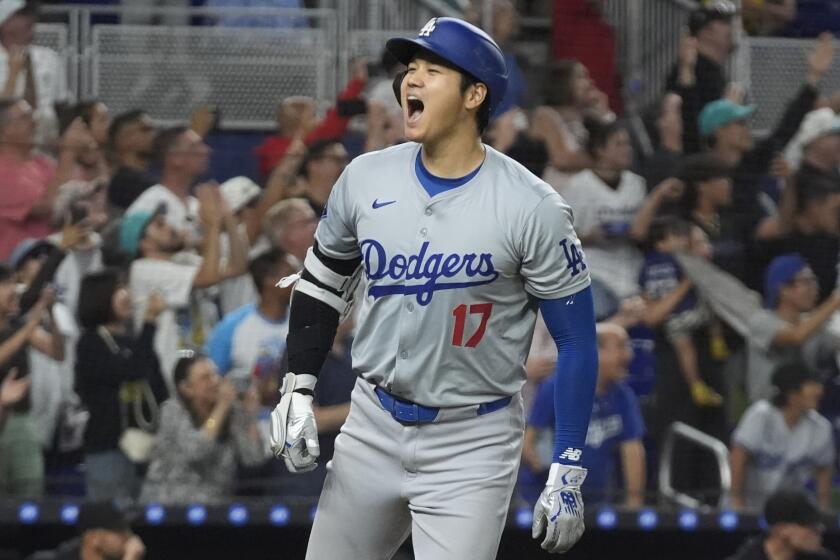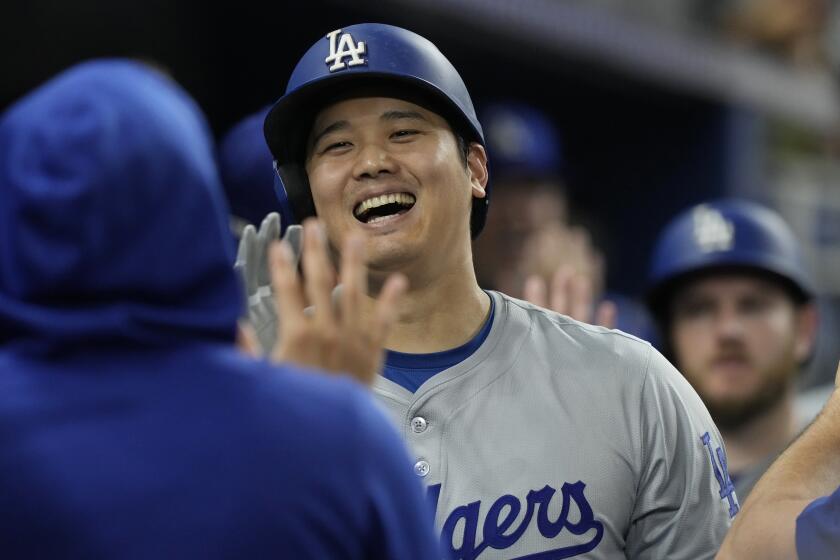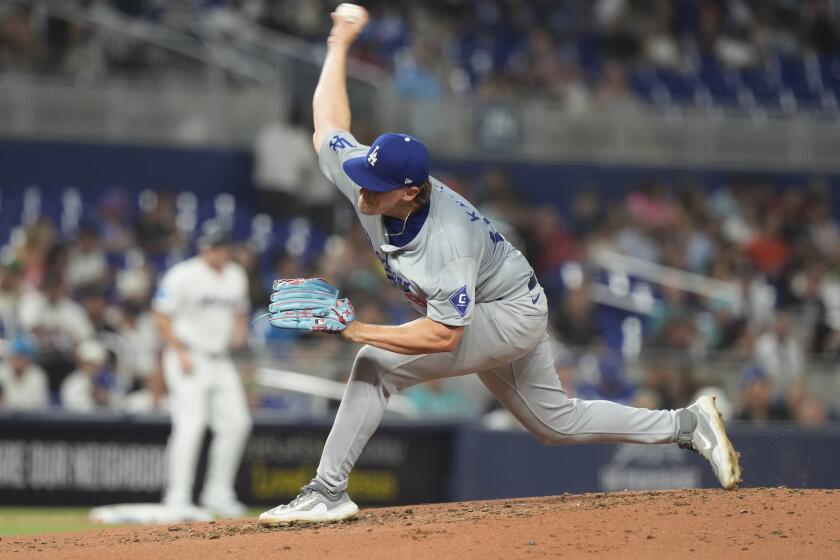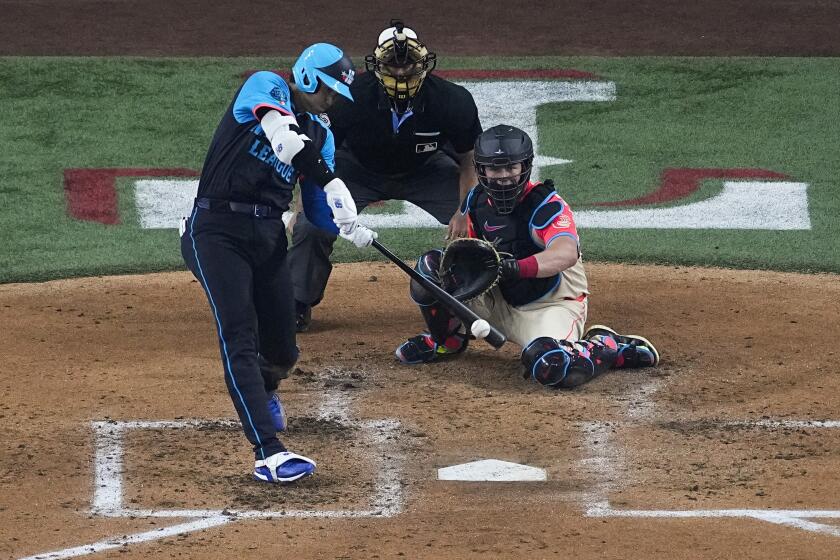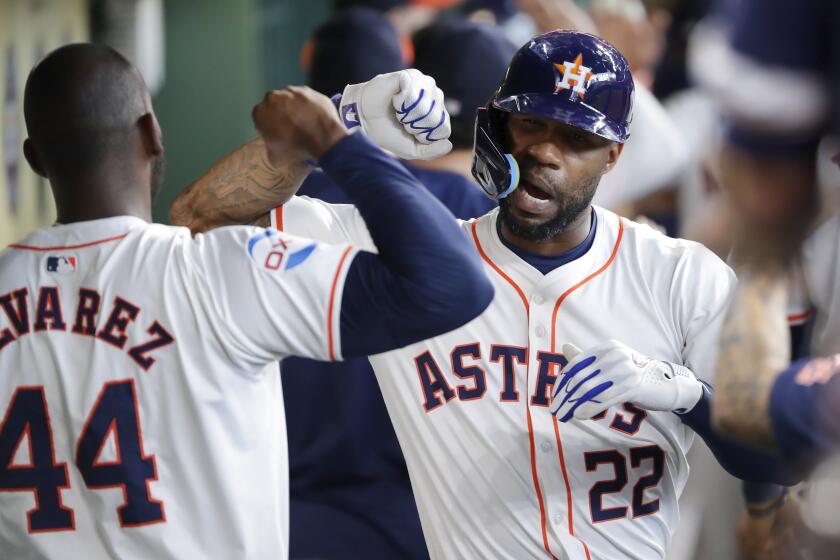Outtakes from the McCourts’ divorce trial
For Dodgers fans, the wait is on — on two fronts.
The season ended Sunday. The playoffs will go on this week, without the Dodgers. It is 22 years, and counting, since the World Series last visited Dodger Stadium.
The divorce trial ended five days ago. Frank and Jamie McCourt threw their final pitches, and Los Angeles Superior Court Judge Scott Gordon has three months to decide whether Frank is the sole owner of the Dodgers or Jamie is a co-owner.
In the absence of Dodgers postseason story lines, here are 10 outtakes from the McCourt divorce trial:
Different styles
The trial offered a contrast between the cerebral David Boies and the folksy but tough-talking Steve Susman. The battle for ownership of Los Angeles’ storied baseball team was fought on behalf of Jamie by Boies, a New Yorker, and on behalf of Frank by Susman, a Texan.
Boies was the celebrity in the court, the attorney who persuaded a federal judge to overturn Proposition 8 and represented Al Gore before the U.S. Supreme Court. On the first day of trial, Boies was asked for his autograph outside court.
Susman wore his Texas Longhorns orange on his tie, and in his presentation.
At one point, Susman asked Frank about an e-mail discussing an indoor pool that Jamie wanted to build at one of the couple’s homes, at a cost of $8 million to $10 million. The e-mail called the renovation “The Natatorium Project.”
Susman: “A nata-what? That has got to be a California word.”
Gordon: “It’s a term for a pool.”
Frank: “Very expensive.”
For the boys
In 2008, the McCourts considered whether to put their assets into two trusts. Leah Bishop, an attorney who advised them at the time, testified that Jamie had proposed calling one of the trusts “The Boys Are Us,” in reference to the couple’s four sons.
“I thought that was a really dumb name,” Bishop said.
Susman joked that the court reporter had spelled the proposed name as “B-O-I-E-S,” with a nod to the opposing counsel.
When Jamie took the stand, she traced the name to the warm relationship between her father and her sons. When Grandpa came to visit, he always enjoyed taking the four boys to Toys R Us.
“He’d say, ‘Let’s go to Boys R Us,’ ” Jamie said. “That’s how we came up with ‘Boys Are Us Trust.’ ”
In the cards
Jamie kept a diary of sorts, on note cards that she said she filled out every night. The evidence at trial included several note cards from the McCourts’ first spring training as Dodgers owners, in 2004.
One entry: “Frank freaked out because we had to land in Cedar Rapids, Iowa, for no apparent reason. That means YAM.” That was her acronym, she testified, for her husband “yelling at me.”
Another entry: “Dinner at Manny Mota’s.”
And one more: “We won against Red Sox, with Schilling pitching v. Perez, Gagne in game!”
The Perez in question would be Odalis Perez, who won seven games for the Dodgers that year. Curt Schilling won 21 games for the World Series champion Boston Red Sox.
Details, details
In a baseball game, you can see the score after every inning. In a trial, you cannot tell the score after every day of testimony.
So, in addition to loading up on the best lawyers money could buy, Frank and Jamie hired spin doctors too.
Team Jamie ripped Frank for a “scorched earth” strategy that included his public airing of her alleged affair, and Team Frank ripped Jamie for embarking on a “demolition derby” strategy to take down Frank and damage the Dodgers.
About time
The sides spared no expense on technical support. At one point, the tech guy for Team Jamie cued up a slide show, with the first picture showing Frank at a game at Dodger Stadium.
The significance? In the picture, Frank wore a watch.
In trying to establish that Frank should not be expected to accurately recall how long a key meeting lasted, Susman got Frank to say he did not often wear a watch. So Boies ordered up the slide show, with Frank wearing a watch in slide after slide.
Boies sensed Gordon had no interest in the slide show, so he called it off.
“It’s probably not worth it,” Boies said.
Lost in translation
In a city in which mass transit often means the carpool lane, knowing how a subway works is about as relevant as knowing how to scrape ice off your windshield. In the deposition of William Griffin, a Boston attorney who had worked for the McCourts but did not testify at trial, Griffin said Jamie had equated signing a personal financial guarantee for Frank’s businesses to touching the third rail.
An attorney representing Jamie, a woman based in Los Angeles, asked what that meant.
“I understand there are people who live in parts of the country who do not have subways,” Griffin said. “The third rail is the rail that carries the electricity, and if you touch it you die — literally. So it is an expression that to me reflects Jamie’s extreme caution in coming close to any sort of financial liability.”
Firing line
Baseball and politics make strange bedfellows.
Corey Busch, a consultant to the sports industry, appeared as a witness for Frank. Whether a spouse had an affair is not legally relevant under California’s no-fault divorce law, but the attorneys for Frank used Busch to get Jamie’s alleged affair into the court record, and into media accounts of the trial.
Did Busch owe Frank a favor? To the contrary. Busch worked for Frank in the months preceding his purchase of the Dodgers, helping to persuade Major League Baseball to approve the deal. Upon approval, Busch believed he would be appointed president of the Dodgers. Instead, Frank fired him.
Afterthought
The interests of the fans were mentioned exactly once in the trial, and not by either of the McCourts, or their attorneys.
The only party to acknowledge the fans was Gordon, the judge, after Dodgers chief financial officer Peter Wilhelm was asked about how “appropriate” the risk was in Frank’s deal to acquire the team.
“I’m not sure what that means,” Gordon interrupted. “For the gentleman [Wilhelm], for Mr. McCourt, for Mrs. McCourt, for fans, for who?”
The question was not answered on behalf of the fans.
Go figure
The trial exhibits included questions and answers prepared for the McCourts by their communications consultant in 2005, in advance of interviews with the Los Angeles Times and Boston Globe. The scripted answers did not help the McCourts win over the media, and neither did a grand procession of image makers from Hollywood and Washington, at least according to Frank’s testimony.
“With all due respect to my friends in the media,” Frank said, nodding to the reporters in the courtroom, “I can’t control what they write. We all know that. I’m still trying to figure that out.”
Geography lesson
The sight of a major league owner on the witness stand is nothing new around here. The city of Anaheim sued Angels owner Arte Moreno after he changed his team’s name to the Los Angeles Angels of Anaheim. In a 2006 trial, Moreno won.
Frank unsuccessfully leaned on Commissioner Bud Selig to stop the name change. The topic still rankles Frank, apparently, given this exchange from one of his depositions in the divorce case:
Question: “City of Los Angeles has only one professional baseball team, correct?”
Frank: “Depends on how you define Anaheim.”
bill.shaikin@latimes.com
More to Read
Are you a true-blue fan?
Get our Dodgers Dugout newsletter for insights, news and much more.
You may occasionally receive promotional content from the Los Angeles Times.




